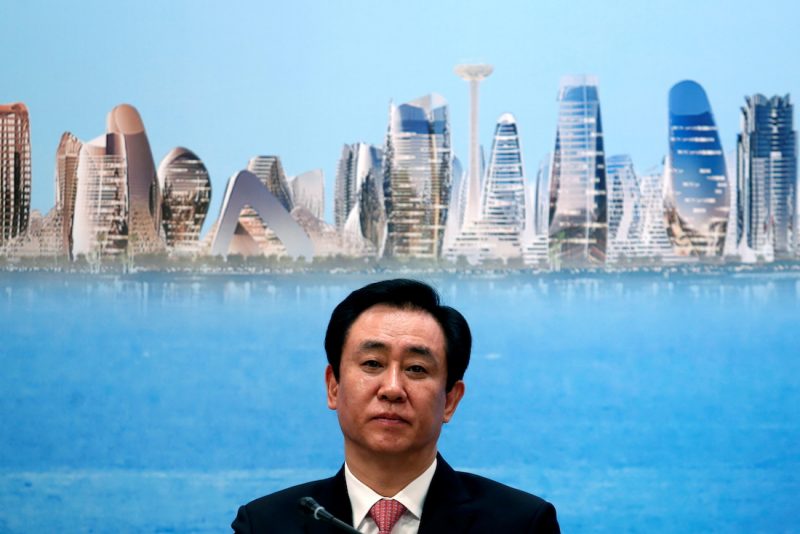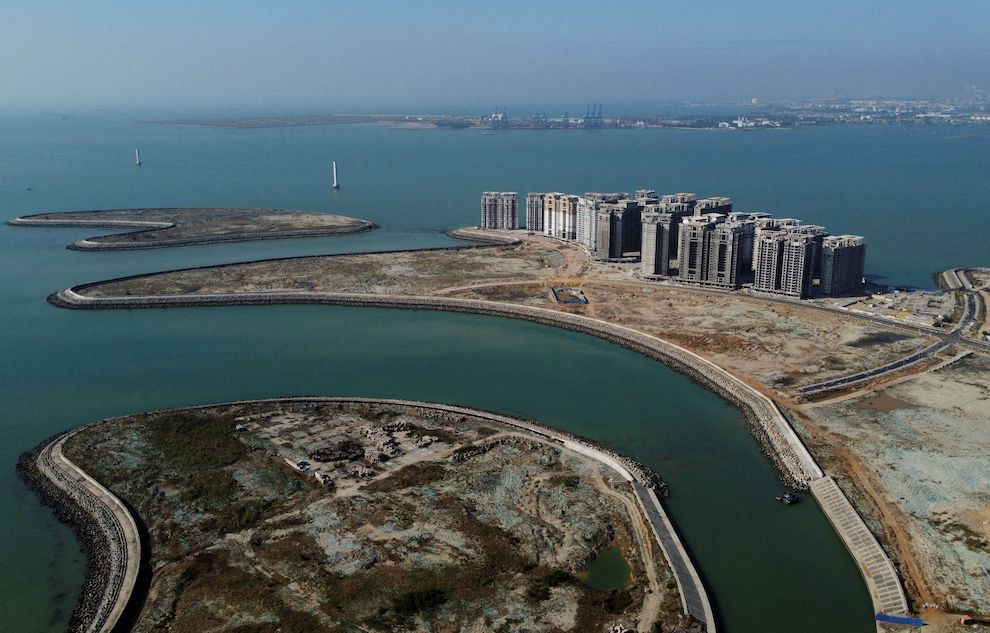Analysts monitoring China are uncertain on how the massive debt crisis at China Evergrande will play out, but Beijing now appears to have a firm hand on the tiller.
Some say the group is more likely to face liquidation because of the criminal probe into its founder Hui Ka Yan, who is being investigated for regulatory breaches, including the possible transfer of assets abroad.
But others say the huge size of the group’s debt means liquidating the company could have “drastic ramifications” for the national economy.
A messy collapse of the property giant could rip through the already-sputtering economy, with hundreds of thousands of unfinished homes across the country and roughly $300 billion worth of liabilities at home in China alone.
ALSO SEE: China-Western Tensions Reshaping Global Business
Evergrande has lurched from one crisis to another over the past two years since it defaulted in late 2021, but Beijing has avoided directly intervening to rescue an enterprise that was not too long ago considered one of the country’s “too big to fail” businesses.
However, now, with the world’s most indebted developer standing at the precipice and a criminal investigation underway, some creditors, investors and analysts believe authorities will step in to manage the fallout – and oversee a ‘controlled demolition’ of the group, or a breakup, similar perhaps to the HNA Group.
One of the reasons for that is China has multiple developers teetering close to collapse, including Country Garden, a second “giant” with close to $200 billion in debt. Developers responsible for about 40% of Chinese homes have defaulted since lending regulations such as the “three red lines” were imposed in 2020.
The prospects of Evergrande’s offshore debt restructuring plan, which is key to its survival, as well as its overall business have been clouded by the criminal investigation into Hui Ka Yan.

Hui’s debt revamp likely rejected
The probe suggests debt revamp efforts led by Hui have been rejected by the central government, which will now step in to take control and formulate new plans, said Xin Sun, senior lecturer in Chinese and East Asian Business at King’s College London.
“The (investigation into Hui) clearly shows that Chinese policymakers prioritise political considerations to economic ones in dealing with Evergrande,” he said.
“From a political perspective, the government needs to ensure the company and its owners paying a heavy price for causing China’s real estate crisis and facing due punishment. Any restructuring can only happen after this political responsibility being taken.”
Evergrande has contract liabilities – payments made in advance from homebuyers – of 604 billion yuan ($83 billion), which is equivalent to around 600,000 housing units, according to a Gavekal Dragonomics report.
Beijing has made the completion and delivery of homes a top priority after the proliferation of unfinished apartments across the country sparked unprecedented collective disobedience in June last year.
“The government’s priority will clearly be to deliver unsold and unfinished housing to homebuyers,” Christopher Beddor, deputy director of China research at Gavekal Dragonomics, referring to the Evergrande situation, said.
“You don’t need a formal government takeover, or even a SOE white-knight investor, for the government to start exerting massive influence over the company’s decisions, or for the entire industry to become more state-owned.”
Evergrande and China’s housing authority did not immediately respond to requests for comment during the week-long National Day holiday.
Risk management committee seen steering debt rejig
Even before the probe into Hui was made public, Evergrande’s debt restructuring plan was clouded by its disclosure that it was unable to issue new debt due to an investigation into its main China unit.
Late last month, it also said it would have to reassess the terms of the proposed restructuring as home sales were not meeting expectations.
“For all of the restructuring … issuance of new notes to an extension is a core part, so I don’t know how you can get it done without that,” said Sandra Chow, co-head of Asia-Pacific research at CreditSights.
Gavekal in its report said that at the very least, an orderly restructuring of Evergrande seemed increasingly hard to achieve. A liquidation petition filed against Evergrande is scheduled for hearing in a Hong Kong court on Oct 30.
A person close to Evergrande, who declined to be named due to the sensitivity of the matter, said the debt restructuring would be delayed but could still go ahead with guidance from a government-appointed risk management committee.
As the liquidity crisis snowballed at Evergrande in 2021, a risk-management committee was established at the company in December which included officials from state companies to assist in its debt and asset restructuring.
An Evergrande bondholder, who also declined to be named, however, said restructuring efforts were set to be derailed by the Hui investigation and the developer could be liquidated even after government intervention.
But there is no clarity on how potentially one of the biggest liquidation exercises globally will play out and what will happen to creditors, especially offshore, as well as suppliers and homebuyers awaiting delivery of apartments.
Of its total liabilities worth $327 billion at the end of June, Evergrande has been in the process of seeking creditors’ approval for restructuring offshore debt worth $31.7 billion, which includes bonds, collateral, and repurchase obligations.
Because of the massive debt pile, worsening cash flow, and the scale of unfinished homes, some analysts wonder whether Evergrande has now morphed from too-big-to-fail to too-complicated-to-exist.
“Evergrande is large enough that its collapse needs to be managed. Partly because of size, (and) partly because of managing expectations,” said Antonio Fatas, INSEAD professor of economics.
In China, “because of the political/economic system and because of the large interference of the government and state-owned enterprises…there will always be a political question on how to share the losses associated with events like this one.”
- Reuters with additional reporting and editing by Jim Pollard
ALSO SEE:
China Evergrande Chairman ‘Suspected of Crimes’, Company Says
Hui Ka Yan and The Rise and Fall of China Evergrande
China Evergrande Files Claim in US Court to Protect Its Assets
The Pledge That Brought Country Garden to the Brink of Default
Chinese Banks Brace For Massive Hit As Homebuyers Refuse To Pay Loans
China Plans to Relax ‘3 Red Lines’ in Boost to Real Estate M&A
























